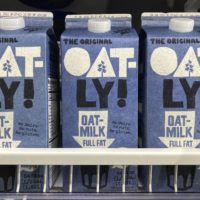
Source: Just Egg
Every week we track the business, tech and investment trends in CPG, retail, restaurants, agriculture, cooking and health, so you don’t have to. Here are some of this week’s top headlines.
Plant-based food retail sales in the US reached $7 billion in 2020, outpacing sales of its animal counterparts for the third year in a row. In Europe, food tech companies raised €2.7 billion, propelled by alternative protein funding.
Food delivery giants abroad continue to raise funds in the race to take the lead – India’s Swiggy has raised $800 million; China’s MissFresh is weighing a $500 IPO; and Grab is said to raise at least $2.5 billion in a SPAC deal.
Our newsletter takes a lot of time and resources to produce. Make a one time or monthly contribution to help us keep it going. Whether it’s $5 or $500, every bit helps and shows us that you value our work.
Check out our weekly round-up of last week’s top food startup, tech and innovation news below or peruse the full newsletter here.
1. Plant-Based Food Worth $7B in 2020, Posting 27% Growth – Food Dive
Plant-based meat had $1.4b in sales, growing 45% overall compared to 2019 and making up 2.7% of all US retail packaged meat sales.
2. European Food Techs Raised €2.7B in 2020, Propelled By Alternative Protein Funding – Green Queen
Capital flowing into the cell-based and plant-based alternative protein startups rose by 178%, with a number of high-profile companies elevated to unicorn status.
3. India’s Swiggy Nears $5B Valuation in New $800M Fundraise – TechCrunch
New investors included Falcon Edge Capital, Goldman Sachs, Think Capital and others. The new round is said to value Swiggy at over $4.9b.
4. Singapore: Food Delivery App Grab Said to Target US Listing in Biggest Ever SPAC Deal – AFN
The company would raise at least $2.5b through a private investment in public equity transaction. The deal values it at around $35b.
5. A Fifth of Food-Output Growth Has Been Lost to Climate Change – Bloomberg
Climate change has been holding back food production for decades, with a new study showing that about 21% of growth for agricultural output was lost since the 1960s.
6. China: Tencent-Backed MissFresh Is Said to Weigh $500M US IPO – Bloomberg
The grocery delivery startup could look to raise as much as $1b in the share sale, though deliberations are still at an early stage.
7. Singapore-Based Retail Analytics Company Trax Raises $640M Series E Led by SoftBank Vision Fund 2 and BlackRock – TechCrunch
Funding will go towards expanding its products, which help brick-and-mortar stores manage their inventory, merchandising and operations.
8. Everli, the European Marketplace for Online Grocery Shopping, Bags $100M Series C – TechCrunch
Verlinvest led the round. New capital will be used to accelerate growth and further expand its international footprint.
9. NY Passes Budget That Includes $60M in Restaurant Relief – Restaurant Dive
The state’s 2021-2022 budget includes $25m for restaurants that provide meals to distressed and under-represented communities and up to $35m in tax credits to help restaurants rehire employees.
10. Futures Trader Burns Tyson with $200M Loss on Fake Cattle – Bloomberg
It took awhile to notice, but Tyson eventually realized late last year that more than 200k of its cattle seemed to have gone missing on a Washington state ranch.
11. ‘Model Minority’ Stereotype Obscures the Food Insecurity Asian Americans Face – Civil Eats
Immigration status and language barriers have long made food access in some Asian American communities a challenge. The pandemic and recent waves of violence and harassment have made the situation worse.
12. Biden Effort to Combat Hunger Marks ‘a Profound Change’ – New York Times
As millions of Americans lack enough to eat, the administration is rapidly increasing aid — with an eye toward a permanent safety net expansion.
Our newsletter is the absolute easiest way to stay on top of the emerging sector, so sign up for it today and never miss the latest food tech and innovation news and trends, Already signed up? Share the love with your friends and colleagues!





